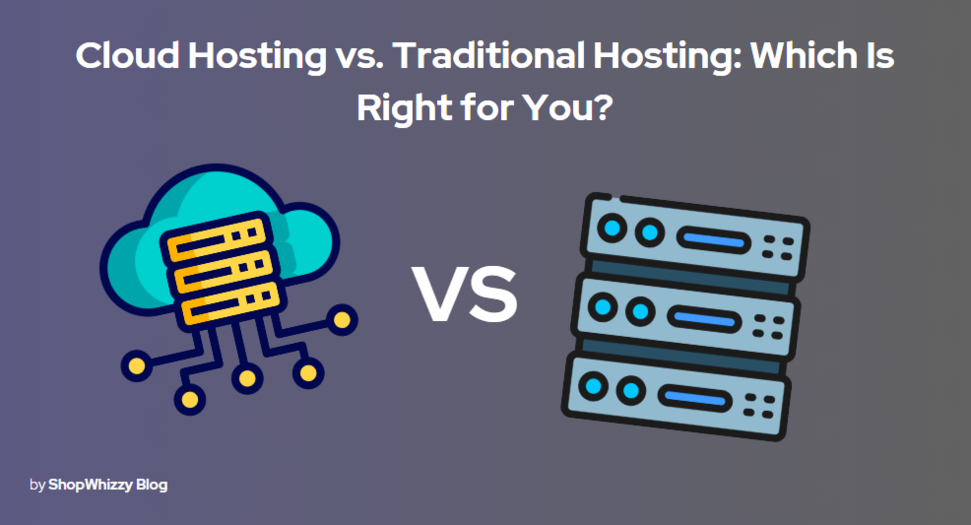Cloud Hosting vs. Traditional Hosting: Which Is Right for You?
-

- Blog
- Dec 30, 2024
-
3views
- Reading time: 4 minutes

Introduction
Cloud hosting services are revolutionizing the way websites are hosted, providing unparalleled flexibility, scalability, and performance compared to traditional hosting. Whether you’re running a personal blog or a growing business, cloud hosting services can scale with your needs. In this article, we explore the benefits of cloud hosting over traditional hosting and help you determine which option is right for your website.
What are Cloud Hosting Services?
Cloud hosting services rely on a network of virtual servers distributed across multiple data centers. This ensures high availability, easy scalability, and dynamic resource allocation. Unlike traditional hosting, which is tied to a single physical server, cloud hosting services allow your website to scale up or down as needed, ensuring optimal performance even during traffic spikes.
Why Choose Cloud Hosting Services?
Cloud hosting services offer many advantages, especially when compared to traditional hosting methods. These benefits include scalability, performance, reliability, and cost-efficiency. With cloud hosting, you can easily manage resources based on demand, ensuring that your website remains responsive and accessible at all times.
Advantages of Cloud Hosting Services
-
Scalability: Cloud hosting services allow for dynamic resource allocation, so you only use what you need.
-
Cost-effectiveness: You only pay for the resources you actually use, making cloud hosting services a cost-effective solution for websites with fluctuating traffic.
-
Reliability: With cloud hosting services, multiple servers ensure that your website remains available, even if one server goes down.
-
Performance: Cloud hosting services deliver superior performance by distributing resources across multiple servers and data centers.
-
Flexibility: Cloud hosting services can be customized to meet the specific needs of your website, whether you need more storage, bandwidth, or computing power.
What is Traditional Hosting?
Traditional hosting refers to hosting solutions where websites are hosted on a physical server, either shared or dedicated. While this type of hosting has been the standard for many years, it lacks the flexibility and scalability offered by cloud hosting services. Traditional hosting typically involves allocating resources such as CPU, RAM, and storage based on the hosting plan selected by the user.
Shared Hosting
Shared hosting is one of the most affordable options available. In this model, multiple websites share the same server and its resources. While this can be a cost-effective solution for small websites with low traffic, it can lead to performance issues, especially when other websites on the same server use a disproportionate amount of resources.
Dedicated Hosting
Dedicated hosting offers a higher level of performance by providing a server exclusively for your website. This eliminates resource sharing with other websites and allows for better performance and control. However, dedicated hosting comes with a higher price tag and requires technical knowledge to manage and maintain the server.
Advantages of Traditional Hosting
-
Cost predictability: Traditional hosting often comes with fixed pricing, which can make it easier to budget for hosting expenses.
-
Simple to manage: For smaller websites with predictable traffic, traditional hosting can be easier to manage and configure.
-
Full control (dedicated hosting): Dedicated hosting provides full control over server configurations and customization options.
Disadvantages of Traditional Hosting
-
Limited scalability: Traditional hosting is constrained by the resources of a single physical server, which can limit growth and performance.
-
Shared resources (shared hosting): Shared hosting plans can result in slower speeds and lower performance due to resource contention.
-
Higher cost for large websites: Dedicated hosting, while ideal for large websites, can be expensive.
Which One is Right for You?
The choice between cloud hosting services and traditional hosting depends on your website’s needs, traffic patterns, and budget. For small websites with predictable traffic, traditional hosting may be the right choice. For larger websites, businesses expecting rapid growth, or those with fluctuating traffic, cloud hosting services are a better option due to their scalability and flexibility. Let’s look at a few examples:
-
Small Blogs and Personal Websites: Shared or basic dedicated hosting may suffice for small websites with limited traffic. Traditional hosting is a good choice for websites with predictable and low traffic.
-
E-commerce Websites: Cloud hosting services are better suited for e-commerce websites with fluctuating traffic or seasonal surges, as they offer the scalability to handle peak traffic times.
-
Large Enterprises: For large companies with complex needs, cloud hosting services provide flexibility, performance, and security, offering a tailored solution for enterprise-level hosting.
Conclusion
Choosing the right hosting solution is essential for the success of your website. Cloud hosting services offer many advantages over traditional hosting, especially in terms of scalability, flexibility, and performance. While traditional hosting can still be a viable option for small websites or those with predictable traffic, cloud hosting services are the ideal solution for businesses expecting growth or experiencing fluctuating traffic demands. By understanding the differences between these hosting types, you can make an informed decision that best meets your website's needs.
